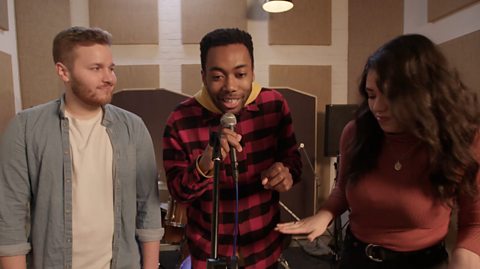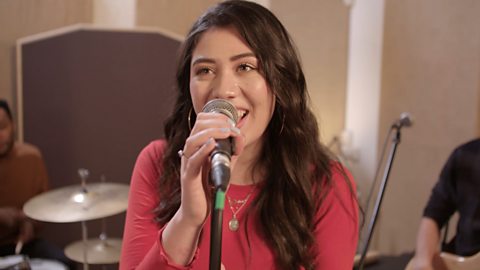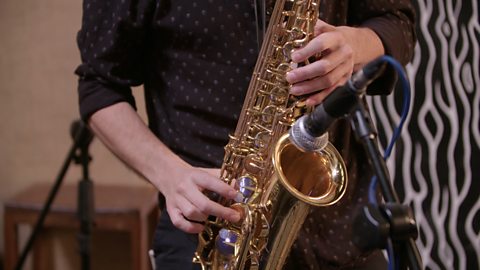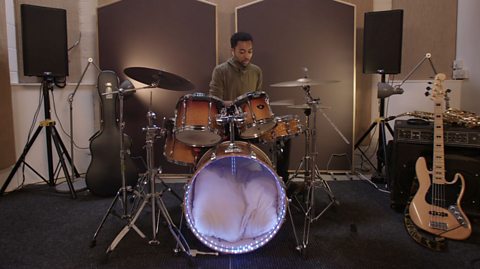- Learn about the key characteristics of musical theatre.
- Explore how musicals such as Mama Mia and Oliver! are put together.
- Discover the different roles in musical theatre.
Watch Rob and Tara talking about musical theatre.
Tara: Hi, Rob. Thank you so much for seeing me today.
Rob: No, thank you.
MUSIC
Tara: I’m a massive musicals fan, so I was wondering if we could find out a bit more about musical theatre and then see if we could work our song, 'The Sound of Us', into more of a musical theatre style track.
Rob: Of course, yeah. I’ve listened to the song and it’s great.
Tara: Could you tell me, what is musical theatre?
Rob: Musical theatre is a big show, bringing together acting, dancing, singing, storytelling ultimately through song.
Tara: Could you tell me a bit about the different kinds of roles you can find in a musical theatre production?
Rob: Onstage, you have performers who will be singing, acting, dancing. Then you have the musicians who are normally underneath the stage, which is called ‘the pit’, and they will be performing the music for the performers. And then backstage, you’ve got a lot of people who are really important to making the show run smoothly: wardrobe, wigs department, sound, lighting, directors, set designers, choreographers. There are a lot of people to make that all happen.
Tara: Can you tell me a bit more about your role?
Rob: Yeah. I work in a number of different capacities within music, one of which is musical director, which is basically the link between the performer and the musicians just to make sure that the musical side of things runs smoothly. And I also work as an arranger where you’re taking existing music and you are writing for the instruments that are used in that production and you’re making it suitable for that performance.
Tara: What type of music might you hear within musical theatre?
Rob: Absolutely everything. There’s musicals with hip-hop in, with gospel, with soul, with Motown, with orchestral.
Tara: How might a song be arranged for a musical theatre production?
Rob: You might change the style of the song totally, where you take a rock song, for example, and you might turn it into a really pretty ballad. You could have a British pop song like your song, and you might turn it into a Latin number. Why don’t we go and try your song round the piano?
Tara: Okay, yeah.
Rob: Great. So, one way we could try this is as a real kind of 1940s, 1950s Broadway style, which will bring real excitement and energy to the piece.
Tara: Okay, great. So, how should I sing it?
Rob: I think with an American twang, would be great.
PIANO PLAYING
Tara: We build it up, we break it down.
When I’m not sure, you bring me round.
Rising up through the noise, I hear a new sound.
I hear it loud and clear.
This is the sound of us.
That was so much fun, thank you.
Rob: You’re welcome.
Tara: So just lastly, could you give us any sort of tips or advice for anyone wanting to get started in musical theatre?
Rob: I think it’s really easy now to research musical theatre. There’s loads of musical theatre music online. You can download that, you can stream that. There’s plenty of stuff to listen to. You can go and watch shows, and also there are local amateur groups where they’re performing shows really regularly and that’s a really good way of learning more about musical theatre and what it brings.
Tara: Thank you so much, Rob!
Musical theatre, also known as a musical, is a show combining songs, spoken dialogue, acting and dancing.
Musicals usually tell a story covering a range of emotions, from humour and love to anger and sadness.
A musical involves lots of different roles, including performers, musicians, lighting and sound engineers, choreographers, directors and producers.
Performers usually need to be able to act, sing and dance.
Many musicals have been turned into films and have become popular all over the world.
What is a musical?
Musical plays have been around for hundreds of years.
Operas - musical plays performed with orchestras - began to be written and performed in the 16th century. They were often written and performed for royalty.
Musicals started to become popular in the 19th century. There were two main types of musical:
- Book musical – driven by a clear plot and original songs (e.g. Les Miserables).
- Jukebox musical – more focused on songs by one band or artist, linked by a plot (e.g. We Will Rock You and Mamma Mia).
Mamma Mia is a jukebox musical based on the music of ABBA.
Performing roles
- Lead roles - solo songs and a lot of lines.
- Chorus - a group of singers and dancers. Some of this group might perform smaller roles as well as being in the chorus.
Types of songs or numbers
- Solo songs - usually about how a character feels about the action going on at the time.
- Chorus/Ensemble numbers - for larger groups of performers. It is often a commentary on the action or plot and helps set the mood.
Listen to All I Ask of You from Andrew Lloyd Webber's musical Phantom of the Opera. This musical is based on a book of the same name by Gaston Leroux.
Spoken word
Between the big numbers, musicals often include dialogue between the characters, as in Oliver!, Guys and Dolls and Anything Goes. But some musicals are sung-through, which means there is no spoken word - as in Les Miserables, Cats and Hamilton.
Listen to Consider Yourself from Lionel Bart's musical Oliver! This musical is based on the book Oliver Twist by Charles Dickens.
Get started with musicals
Find out if there are any musicals at your school or with local organisations and see if you can take part.
Singing and acting
If you like singing or acting, find a song from a musical which you enjoy singing. Look up backing tracks online and practise singing along. Practise this and you could use it for an audition.
You can also sing with friends and have a go at some duets or chorus numbers.
Playing an instrument
If you play an instrument, you might want to see if there are spaces in the band or orchestra.
Get involved
You could also help with costume design, sound and lighting.
Quiz
Keywords
| Keyword | Definition |
|---|---|
| producer | This person oversees all of the production, from what goes on stage, to back stage crew, marketing etc. |
| director | This person is in charge of the drama, dialogue and movement on the stage. |
| choreographer | Where there are dance numbers, the choreographer is in charge of routines and movement. |
| number | An item in a music production, be it a solo song, dance or chorus. |
| jukebox musical | A musical based on a collection of songs by an artist or band. |
| book musical | A musical that focuses on a clear plot. |
GCSE exam dates 2025
Find out everything you need to know about the 2025 GCSE exams including dates, timetables and changes to exams to get your revision in shape.

More on Performing music
Find out more by working through a topic
- count1 of 6

- count2 of 6

- count3 of 6

- count4 of 6
